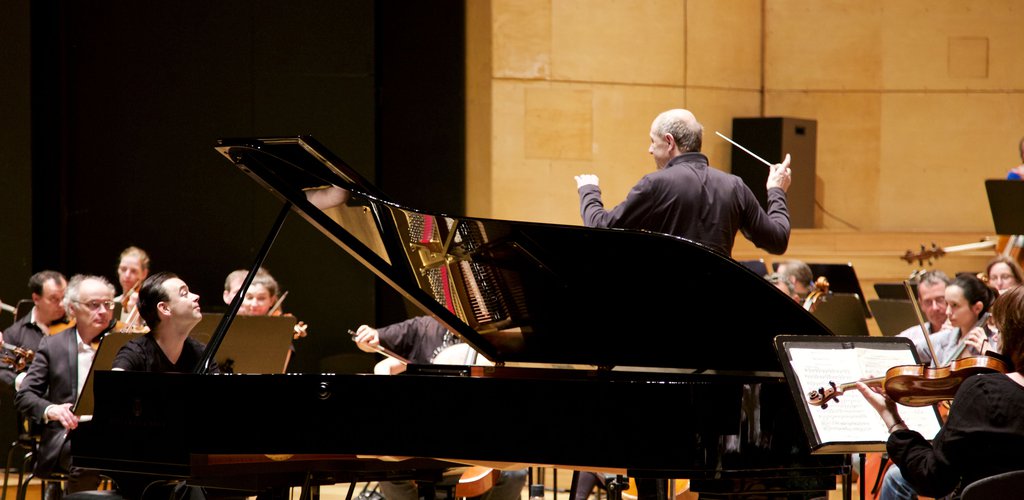Whenever it comes to Liszt’s music and Dejan Lazić’s name is also mentioned, we can be sure that we are in for something great. He is probably our era’s most famous interpreter of Liszt’s piano music. That is why the audience is so delighted to welcome the world-famous pianist, originally from Croatia, as the soloist in the Liszt concert at the Bridging Europe festival of the Budapest Festival Orchestra and Müpa Budapest. Julia Váradi spoke with Dejan Lazić.
What brought you to Liszt and why do those hearing you play Liszt have the impression that they can perfectly understand and even feel what the composer was thinking at the time?
Your question is a huge compliment, thank you so much. But before answering, I must add to more names to this introduction: Iván Fischer and the Budapest Festival Orchestra. Without them, I wouldn’t be able to interpret Liszt like this, the way I’d like to. So it’s very important to know that the orchestra and, of course, the conductor have a crucial role in all of the Liszt pieces featured in the concert; they are on a completely equal footing with the soloist. This is also what makes this program so great. But back to the original question, as a young kid, at the age of 12-13-14, I spent every summer in Szombathely, at the famous Bartók Festival.
I guess your parents, who were also musicians, took you with them to this extraordinary event, featuring the crème de la crème of the Hungarian music scene.
That’s exactly how it happened, and I’m still very grateful to them. The festival was, of course, centered around Bartók’s music, but other great Hungarian composers were also often included in the program. These experiences seemed to me a bit like how we imagine the best ever music school might be. The highest level of music education.
Now that you’ve mentioned this, we should also acknowledge the Hungarian musicians you admittedly learnt a great deal from.
Yes, I’d like to confirm this, as Péter Eötvös, Imre Rohmann, Zoltán Kocsis, and others as well, greatly contributed to the formation of my future musical knowledge. That’s why I have such a strong connection with Hungary and the Hungarian musical scene. Although unfortunately I don’t speak Hungarian, I feel perfectly at home in Budapest when I meet Hungarian musicians. This will be at least the twelfth or thirteenth season in a row when we play together with Iván Fischer. I’ve also often played Liszt under his baton; both piano concertos and the Totentanz. And his solo pieces, of course.
I have very clear memories of you playing Liszt’s Totentanz at the London Proms and having a huge success with the Festival Orchestra. Many still think it was the best concert ever.
Oh, I’ll never forget it. We also gave a Midnight Concert after the event, with a raffle and a huge party. It was a wonderful experience. It was ten years ago, but I can still conjure up every moment of it.
You are going to play Liszt’s Piano Concerto No. 1 (in E-flat major) at this concert in Budapest. We know that when he wrote this piece, the composer had already lost some of his virtuosity and rarely agreed to play as a soloist. However, the work was so important to him that he decided to play its solo part at the premiere. Why is this composition special?
The piano concerto in E-flat major is like a collage, which means that its parts are not strictly separable but produce an overall impact. The themes return again and again, and they refer to other well-known pieces, which makes the composition extremely exciting. Liszt was always committed to new compositional forms. At that time, he was spending more and more time composing and didn’t leave too much space for himself as a performer. Nevertheless, it is still unfathomable how this man was able to do such an incredible variety of things at the same time. Performing involved a lot of traveling, and all that at the speed of the transport of the time, while composing music, requires a lot of time and deep thought. And, in addition to his own compositions, we shouldn’t forget the huge number of transcriptions he created from the works of the most diverse composers.
Referring to the title and theme of our program, Bridging Europe, we can easily declare that Liszt was the true “travelling European”. He introduced several great - but not yet really famous - composers to European audiences through his transcriptions for piano.
So you say Liszt was the “traveling European”. But if we follow the life of Dejan Lazić, who was born in Zagreb, lived in Salzburg and studied there in the Mozarteum, has visited Hungary a number of times, as well as Europe, of course, and many other countries in the world, and is now living in Amsterdam, then we can easily call him the traveler of today’s Europe. Don’t you think so?
If I think about it, Liszt is truly one of my most important idols. I often say that I became a musician because of Mozart, but I was inspired by Liszt to play the piano, compose and practice being a European. As the father of symphonic poems, he had such a great impact on me that I even composed a symphonic poem entitled Mozart and Salieri, where, besides Mozart’s greatness, I also tried to serve justice to Salieri, as he too was a great composer and also Liszt’s teacher. But I’d like to add that what really makes me admire these great artists, like Liszt, Bartók or Thomas Mann, is not necessarily just their talent and their artistic achievements, but the kind of people they were and the way they shed light on the most important things with their insight, their openness and their tolerance.
